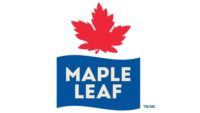Maple Leaf Foods Inc. recently held its 13th annual Food Safety Symposium as part of the company's commitment to providing safe food for all Canadians and fostering knowledge-sharing among experts within the food industry. Guests met again in person for insightful and innovative conversations about how food production processes can be optimized while improving sustainability.
With the theme "Bridging the Gap: A Symposium on Food Safety and Sustainability," the event began with an introduction from Maple Leaf Foods' President and CEO, Curtis Frank, and Chief Food Safety and Sustainability Officer, Randy Huffman.
"We must have an open mind about the things that we are learning, to listen to the critics of our industry and people who think the food system should change. We need to embrace change," said Huffman, speaking on the future of sustainable food production.
Keynote speaker, Evan Fraser, director, Arrell Food Institute, University of Guelph, spoke on the topic of the future of food. Fraser led a dynamic discussion on the current and future state of food production, highlighting the importance of food safety in this innovative journey. "Feeding the future is one of the defining challenges of humanity. While this challenge is huge, we have new ways of producing food that can boost the environment and health of people," said Fraser.
Fraser shared three predictions that will frame the next 10 years in the future of food. "I think we're about to go through a confusing period of disruption. As we look forward into the next 50 years, we must be asking tough questions like what the impact on farmers and communities will be — do we have the wisdom and humility and compassion to stay ahead in this transition and to help communities and families as these changes happen?"
In addition, Faye Cooper, vice president of sustainability execution, asset reliability, and industrial engineering, and Steven Tsuyuki, senior director of corporate sanitation, both from Maple Leaf Foods, addressed how sanitation can be executed sustainably.
"How do we eliminate the damage that's caused by sanitation?" asked Tsuyuki, who shared the actions Maple Leaf Foods has taken to mitigate the environmental impacts of its sanitation programs, without compromising food safety. "What we're really hoping to do is share some of our best practices with the rest of world. When it comes to food safety and sustainability, there is no advantage to 'holding cards close to our chest' — it is a global effort," said Cooper.
A second panel addressed the possibility of innovations in sustainable packaging without compromising food safety. Moderated by Spir Marinakis, VP, food safety, quality, technical services and sanitation at Maple Leaf Foods, panelists included Crystal Howe, director of sustainability at Ice River Sustainable Solutions, Naeem H. Mady, vice president of regulatory market access at Intertek Assuris, Beth Mielbrecht, associate director at Intertek Assuris, and Nicole Tucker, senior director of quality and sustainability at Loblaw Cos. Ltd.
Tucker shared Loblaw's plastic waste reduction commitment and the company's Golden Design Rules. "Packaging is key to maintaining quality and food safety. We need to ensure we are empowering the food safety teams at our facilities to meet the needs of our customers." Panelists also discussed sustainable food packaging and the process to sustainably recycle plastic. "Plastic is not going to disappear," said Mady. "But we do have to mitigate the amount of plastic in the environment."
In the closing panel, Leaya Amey, manager of sustainability at Maple Leaf Foods, led a conversation with Scott Grant, senior director of programs at My Green Lab, and Diane Wood, director of technical services at Maple Leaf Foods, on the topic of "Building sustainability in the laboratory."
Maple Leaf Foods fosters an ongoing partnership with My Green Lab, and its Corporate Central Laboratory in Puslinch, Ontario, was the first laboratory in Canada to receive "Green" status in the My Green Lab (MGL) certification program.
"Our mission is to provide the highest quality of laboratory testing through technical expertise, leading technologies, and continuous improvements," said Wood.
Huffman wrapped up the day by reinforcing the importance of bringing together food safety and sustainability in how the food system operates and commending the engagement of all those participating in the symposium. In a closing reflection on the day's events, he shared a quote from American cultural anthropologist Margaret Mead: "Never doubt that a small group of thoughtful committed individuals can change the world. In fact, it's the only thing that ever has."
Next year's Maple Leaf Foods' Food Safety Symposium date will be announced soon. For information on food safety at Maple Leaf Foods, visit here.
Source: Maple Leaf Foods Inc.


Report Abusive Comment